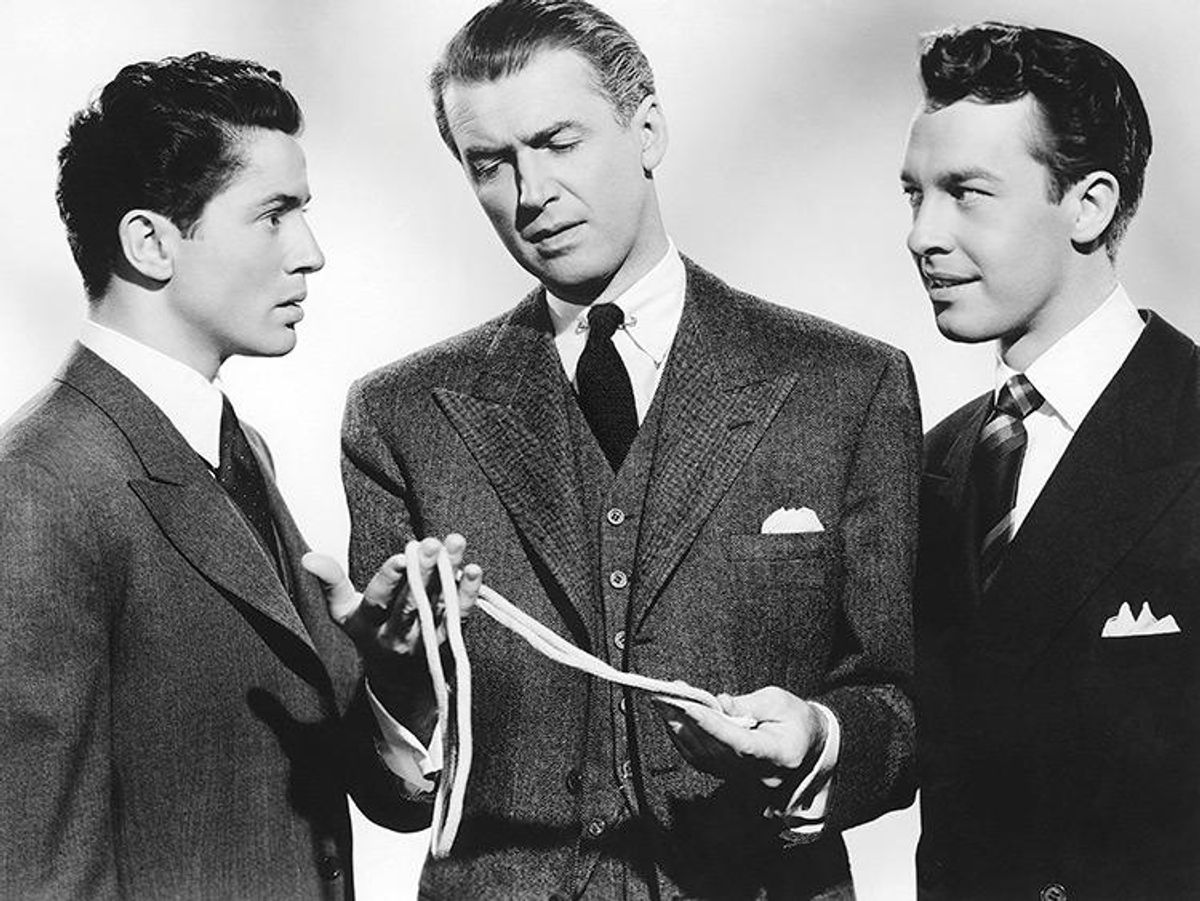The gay duo in Alfred Hitchcock's 1948 Rope are told, "Mind your p's and q's." It's cheeky advice for Brandon (John Dall) and Philip (Farley Granger), who have just committed a murder and had the audacity to hold a dinner party with the buffet set atop a cassone containing the dead body.
The idea of a desecrated marriage chest is a naughtier Hitchcock joke than the male flirtation in Strangers on a Train. And Rope is more than suspense--it still provides a knowing, tickling fascination 70 years later.
Rope is famous in film history for Hitchcock's single-camera illusion (the film contains ingeniously hidden editing cuts) that holds the characters' movements in space like a dance. But the director also taught audiences how to move intellectually amid devious character psychology and permissive social decorum. Rope's depiction of white upper-class Manhattan gays displays that Old Hollywood knack of turning a popular audience into insiders and sophisticates.
It took a mischievous genius to make a post-WWII movie with subtle queer characters. Brandon and Philip's special bond is apparent only to those mature enough to spot their intimacy. It's in the way Dall and Granger look at each other. And when James Stewart appears as Rupert, their college professor (and possibly their former lover), the very tone of the actors' exchanges reveals cozy familiarity.
All-American Stewart had not been this casually sexy since his duets with Margaret Sullavan in Lubitsch's perfectly hetero The Shop Around the Corner (1940), while doe-eyed Granger made sensitive Philip (a submissive) the perfect partner to strong-jawed Dall, whose Brandon (a dom) keeps his cohort's nervousness under control. Even their names define their relationship by connoting feeling and ownership.
Brandon, Philip, and Rupert take turns as leads in Hitchcock's dance; they play hide-and-seek with a homosexuality that in the middle of the 20th century was still forbidden. (Other famous 1940s films, such as The Lost Weekend and Crossfire, kept the subject totally disguised.)
Rope is based on a British stage play by Patrick Hamilton, adapted by actor Hume Cronyn from a screenplay by gay theater legend Arthur Laurents. The production showed Hitchcock's interest in color photography and converting theatrical technique to the screen. Difficult and elaborate camera movements followed the characters in one setting (a New York penthouse with the backroom view changing only from early evening to night).
But this closely observed behavior also makes Rope a sexual and social ballet of manners and private passions. Philip and Brandon are snobs, that age-old gay defense mechanism. Their crime repeats that of the infamous gay duo Loeb and Leopold, whose actual 1920s Chicago "thrill killing" became the basis of such later movies as Compulsion (1959), with Dean Stockwell's great gay performance, and the 1992 indie film Swoon. But Hitchcock goes beyond scandal to concentrate on character. "We did wake up on the wrong side of the bed!" a snarky maid pouts to Philip. The guest who exits the party telling Brandon and Philip "Mind your p's and q's" draws attention to the film's many conspicuous utterances of the words "peculiar" and "queer." It's Hitchcock and Laurents's code for what's really going on, since we already know who done it.
The film opens audaciously with Philip and Brandon strangling their victim, who's screaming in close-up. It is a petit mort in the middle of a murderous afternoon threesome, but the gayest moment in Rope may be when Rupert confronts the all-but-out Philip: "I wish I could come straight with what I want to know. Unfortunately, I don't know anything. I merely suspect."
Stewart's interrogation of Philip is undeniably sexual. The scene's modest gay inflection surpasses the intrigue Neil LaBute brings to contemporary theater, where gayness and sex are always dirty and nihilistic.
Rope certainly treats murder in a ghoulish way (the weapon itself becomes a fiendish joke), but its story of one-upmanship and intellectual warfare among a particular class of gay men is ultimately universal; it shows extraordinary insight, subtly observing mid-20th-century gay behavior. The film's greatest suspense is in its recognition of secret, furtive lust. Certainly Hitchcock and Laurents knew such hookups as part of modern
urban life.
Because of Rope, the whole world knows it, too.



















































































